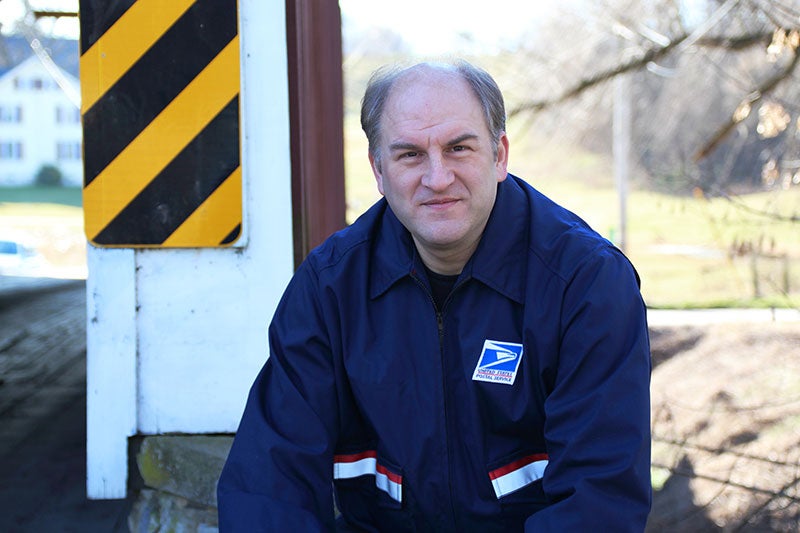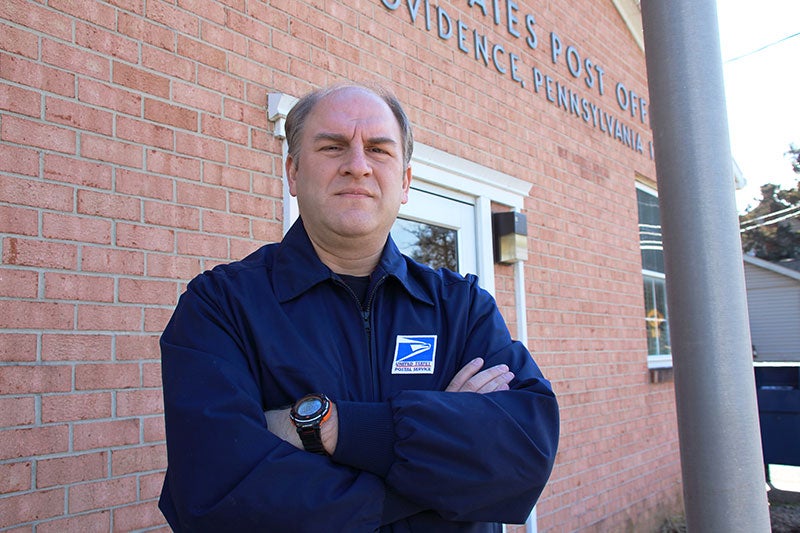Supreme Court Media Kit |
The Ideal Job
Gerald Groff thought he had found the perfect job. It would give him the opportunity to serve his community, it would be rewarding, and it would allow him to honor the Lord’s Day.
Becoming a full-time mail carrier for the United States Postal Service was that ideal job. But just as Gerald was about to realize his dream, he was forced to give it all up. In a permanent, full-time carrier role, Gerald would have the stability of delivering to the same route each day, benefits, including vacation days, and most importantly to him – all Sunday’s off. When the USPS began to require Sunday delivery for Amazon, right when he was on the verge of his ideal job, Gerald changed Post Offices, surrendered all his seniority, and sacrificed his hope to be a full-time carrier because he was unwilling to deny the Lord by working on even one Sunday.
Gerald was so close to his dream job where he would be able to honor the Sabbath permanently in a full-time position that was not expected to work Sunday Amazon deliveries. But to reach his job goals meant he had to make a decision – violate the Lord’s Day to get his full-time employment wish or to honor God and trust Him with the outcome.
He chose to trust God.
Sunday Delivery
Gerald began working for the USPS in 2012 because he could honor the Lord’s Day while enjoying a good and rewarding career. As a substitute (part-time) mail carrier in his family’s native Lancaster County, Pennsylvania – an area steeped in religious tradition – Gerald delivered mail to any route that was requested, worked any shift that was offered, including many Saturdays and holidays, to reach his goal of becoming a full-time mail carrier. Some days he delivered mail to as many as 700 homes in his rugged, rural community.
When the Post Office contracted with Amazon to deliver packages seven days a week, it gave no choice to its employees. Gerald did all he could to accommodate the Post Office, including covering extra duties and routes so his co-workers could have easier Saturdays and holidays off. All he asked in return was that the Post Office accommodate his deeply held belief that he should honor the Lord’s Day. He delivered to some of the most difficult routes in even the worst weather – usually using his personal vehicle – often including extra work on Saturdays and every holiday, to show his willingness to accommodate both the Post Office and his co-workers.
At first, Gerald’s supervisor accommodated his commitment to honor the Lord’s Day.
When that accommodation ended suddenly, Gerald chose to transfer to a new post office that didn’t require Amazon delivery at that point, which meant sacrificing all his seniority on his path to becoming a full-time carrier. But then that new post office also began to require Sunday delivery. For missing Sundays to honor the Lord’s Day, the USPS then subjected Gerald to eight separate pre-disciplinary reviews, each one requiring him to drive out of his way to the hub post office, adding extra driving time to his day while he was still required to fulfill his obligation to deliver his assigned route. He received a “Letter of Warning,” and two separate Suspensions (totaling 21 days) over the course of two years, all while working daily under the looming threat of losing his job each time that he went to work.
Dream Sacrificed
It would have been a temptation for Gerald to simply work a Sunday here or there to maintain his seniority so that he could eventually become full-time and have every Sunday off to honor the Lord’s Day, but to Gerald that meant violating both his conscience and God’s law, something he just could not do. No American should be forced to choose between their livelihood and their faith.
During that time, Gerald was also subjected to harsh & unfair treatment, mocked by his supervisor and docked pay without justification. After two years of progressive discipline, hostility from supervisors, and not knowing if any day was the day he would be terminated, Gerald resigned on January 18, 2019. Just like Gerald stepped in to help other employees when they needed it, most Americans are eager to help each other. Gerald did his best to accommodate the USPS and sought to serve his co-workers, but the USPS refused to accommodate him.
The district court sided with the USPS, concluding that a reasonable accommodation need not eliminate the conflict between work and religion and that accommodating Groff would pose an undue hardship on USPS.
On appeal, the Third Circuit affirmed, concluding that while the USPS failed to offer Groff an accommodation, an exemption from Sunday deliveries would cause undue hardship to his employer.
The Supreme Court of the United States heard oral argument in the case on April 18, 2023.
in a unanimous decision in June 2023, the Supreme Court granted a victory Groff. The far-reaching decision affects employment rights at every workplace with at least 15 employees in every state in the country.
The Court held that federal law requires workplaces to accommodate their religious employees unless doing so would result in substantial increased costs in relation to the conduct of the employer’s business. Previously, employers could avoid granting religious accommodations to employees of faith simply by pointing to trifling, minimal, or “de minimis” effects. This decision means that more employers will be legally required to respect their religious employees by granting them accommodations. Employees of faith often seek religious accommodations to honor their holy days, to take prayer breaks during the day, to dress according to their religious beliefs, or to otherwise not be forced to violate their religious beliefs on the job.
“This is a landmark victory, not only for Gerald, but for every American. No American should be forced to choose between their faith and their job,” said Kelly Shackelford, President, CEO, and Chief Counsel for First Liberty. “The Court’s decision today restores religious freedom to every American in the workplace. This decision will positively help millions and millions of Americans – those who work now and their children and grandchildren.”
In response to the decision, Gerald Groff said, “I am grateful to have had my case heard by the U.S. Supreme Court and that they have decided to uphold religious liberty. I hope this decision allows others to be able to maintain their convictions without living in fear of losing their jobs because of what they believe.”
In January 2025, the United States District Court for the Eastern District of Pennsylvania rejected the USPS’s motion for summary judgement, ordering a trial for Groff.
“The Supreme Court’s ruling is making a difference on the ground for real people. The trial court’s ruling is proof that courts are taking religious employees’ right to religious accommodations seriously – allowing more employees of faith to present their cases in court before a jury of their peers,” said Stephanie Taub, Senior Counsel for First Liberty Institute.
In May 2025, attorneys reached a settlement in the case.
News Release
For Immediate Release: 6.29.23
Contact: John Manning, media@firstliberty.org
Direct: 972-941-4453
Supreme Court Delivers Unanimous Landmark Victory for Postal Carrier
Decision means fewer religious employees will have to choose between their faith and their job.
Washington, DC—Today, in a unanimous decision, the Supreme Court of the United States granted a victory to former postal carrier Gerald Groff against the United States Postal Service, after Groff lost his job for observing the Sunday Sabbath. The decision strengthens legal protections for employees seeking religious accommodations, such as schedule changes to observe holy days. The far-reaching decision affects employment rights at every workplace with at least 15 employees in every state in the country.
The Court held that federal law requires workplaces to accommodate their religious employees unless doing so would result in substantial increased costs in relation to the conduct of the employer’s business. Previously, employers could avoid granting religious accommodations to employees of faith simply by pointing to trifling, minimal, or “de minimis” effects. This decision means that more employers will be legally required to respect their religious employees by granting them accommodations. Employees of faith often seek religious accommodations to honor their holy days, to take prayer breaks during the day, to dress according to their religious beliefs, or to otherwise not be forced to violate their religious beliefs on the job.
“This is a landmark victory, not only for Gerald, but for every American. No American should be forced to choose between their faith and their job,” said Kelly Shackelford, President, CEO, and Chief Counsel for First Liberty. “The Court’s decision today restores religious freedom to every American in the workplace. This decision will positively help millions and millions of Americans – those who work now and their children and grandchildren.”
In response to the decision, Gerald Groff said, “I am grateful to have had my case heard by the U.S. Supreme Court and that they have decided to uphold religious liberty. I hope this decision allows others to be able to maintain their convictions without living in fear of losing their jobs because of what they believe.”
Aaron, Streett, Partner at Baker Botts LLP, who argued Groff’s case before the Justices, said, “We are thrilled the Court today recognized that an America that values religious pluralism should respect the religious liberty rights of every employee. Our nation has a long history of protecting its employees from being treated differently at work just because of their faith. This decision is consistent with that history and is a tremendous win for all people of faith.”
Randal Wenger of the Independence Law Center added, “The Court understood that the previous Hardison standard was unworkable. We are grateful that the Justices determined that every employee deserves equal opportunity and fair treatment in the workplace.”
Alan Reinach of the Church State Counsel said, “Restoring Title VII’s focus of protecting religious employees protects Americans of all faiths from discrimination. Today’s decision strengthens legal protections for employees seeking religious accommodations and effects employment rights at every workplace with at least 15 employees in every state in the country. This is a great day for religious liberty in our nation.”
The Court remanded Gerald Groff’s case to the appellate court for reconsideration in light of the new legal standard.
To learn more about the case, visit FaithfulCarrier.com.
# # #
About First Liberty Institute
First Liberty Institute is the largest legal organization in the nation dedicated exclusively to defending religious freedom for all Americans.
To arrange an interview, contact John Manning at media@firstliberty.org or by calling 972-941-4453.
1.31.25 – District Court Order
U.S. Supreme Court
Merits Stage Amicus Briefs
2.28.23 – Amicus Brief of Members of Congress
2.28.23 – Amicus Brief of Seventeen States
2.28.23 – Amicus Brief of John Kluge
2.28.23 – Amicus Brief of the American Center for Law and Justice
2.28.23 – Amicus Brief of the Council on American-Islamic Relations
2.28.23 – Amicus Brief of Joseph Holland
2.28-23 – Amicus Brief of Zionist Organization of America
2.28.23 – Amicus Brief of Liberty Counsel
2.28.23 – Amicus Brief of Citizens United
2.28.23 – Amicus Brief Alabama Center for Law and Liberty
2.28.23 – Amicus Brief CatholicVote.org Education Fund
2.28.23 – Amicus Brief of Jeffery Podell and Fieders Foundation
2.28.23 – Amicus Brief of Founders’ First Freedom, Inc.
2.28.23 – Amicus Brief of Americans For Fair Treatment
2.28.23 – Amicus Brief of Asma Uden, Steven Collis, and The American Jewish Committee
2.28.23 – Amicus Brief of Over 400 Physicians, Surgeons, Nurses and Medical Professionals
2.28.23 – Amicus Brief of The Union of Orthodox Jewish Congregations of America
2.28.23 – Amicus Brief of Former EEOC General Counsel
2.28.23 – Amicus Brief of Religious Liberty Law Scholars and Employment Law Scholars
2.28.23 – Amicus Brief of American Hindu Coalition
2.28.23 – Amicus Brief of Airline Employees for Health Freedom
2.28.23 – Amicus Brief of The Muslim Public Affairs Council
2.28.23 – Amicus Brief of Louis Brandeis Center for Human Rights Under Law
2.28.23 – Amicus Brief of American Constitutional Rights Union
2.28.23 – Amicus Brief of The Beckett Fund for Religious Liberty
2.28.23 – Amicus Brief of Robert Roesser
2.28.23 – Amicus Brief of the Robertson Center for Constitutional Law
2.28.23 – Amicus Brief of The General Council of Seventh Day Adventists
Cert Stage Amicus Briefs
9.26.22 – Amicus Brief of Members of Congress
9.26.22 – Amicus Brief of Seventeen States
9.26.22 – Amicus Brief of Religious Liberty and Employment Scholars
9.26.22 – Amicus Brief of former EEOC General Counsel
9.26.22 – Amicus Brief of John Kluge
9.26.22 – Amicus Brief of Robert Roesser and Christian Legal Society
9.26.22 – Amicus of the Thomas More Society and the Jewish Coalition for Religious Freedom
9.26.22 – Amicus of the American Center for Law and Justice
9.26.22 – Amicus of the Rutherford Institute
9.23.22 – Amicus Brief of Asma Uddin and Steven Collis
9.22.22 – Amicus Brief of the American Center for Law and Liberty
Third Circuit


